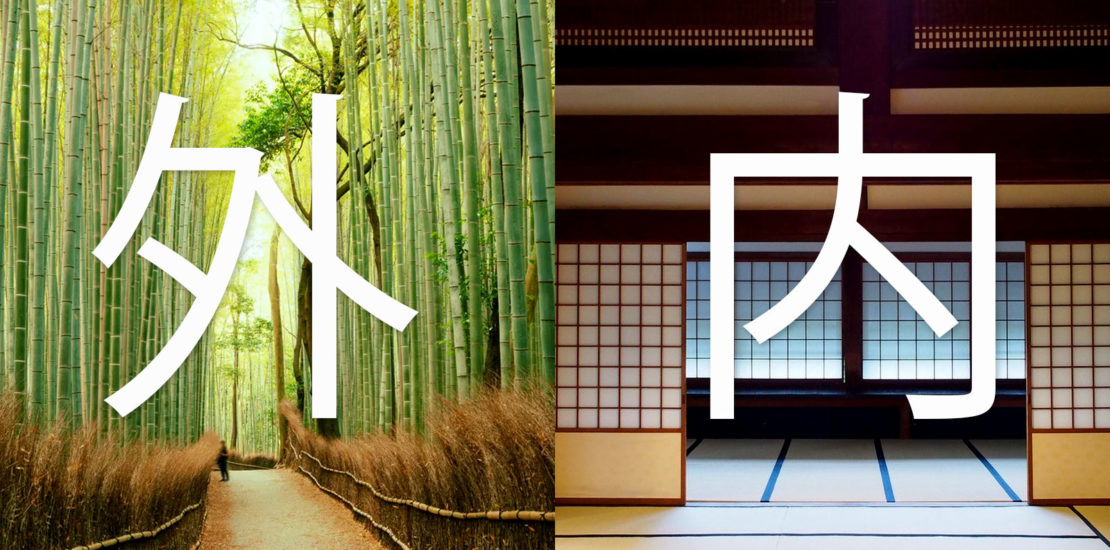Along with Honne and Tatemae, the duality of Uchi-Soto is another Japanese social custom that continues to bewilder and frustrate the Gaijin.

Uchi-Soto is another very unique concept that is an integral part of the Japanese socio-cultural fabric. Uchi (内) means Inside and Soto (外) is outside.
The Japanese by nature believe in groupism. The concept of individualism or being the lone wolf is alien to Japan and the emphasis on collectivism and maintaining harmony within the group runs through each and every facet of their lives. Be it family, school, university or even work place, the Japanese have always been part of a group and they take their role in that group very seriously.
Coming back to Uchi and Soto, Uchi is the inner group that one belongs to and Soto is everyone outside that group. You must be very deferential and polite towards the outer group while referring to yourself and everyone else in your inner group with the utmost humility. The inner group must be humbled and outer group honored at all times. While interacting with people outside their group the Japanese use Keigo or honorific language.
In Japanese there are specific words used when you want to show the other person respect. Verbs are conjugated not only in terms of tense but also level of politeness. Another interesting concept of Uchi Soto is that the groups are dynamic and fluid. Depending on the situation you can be part of an inner group at one point and outer group at anther point.
To understand Uchi and Soto better, let us take a few examples.
Uchi and Soto in relationships and social circles
Your family is always your inner group and every one outside the family belongs to the outer group. Whenever you speak of your family to an outsider you must always speak of them with utmost humility. The words used for your family members when you refer to them infront of outsiders are different than the words you will use for their family members. For example – you will refer to your father as Chichi and mother as Haha but when you speak to an outsider about their parents you will use Otousan and Okasan.
If you belong to a club – Let us say a Karate club or even a study group, everyone part of that club will be your inner group and outside that group will be an outer group.

Uchi and Soto at work
Understanding Uchi and Soto and using the Keigo plays a key role in adjusting to and understanding Japanese business culture.
The organization you belong to is your inner group and everyone outside is in the outer group. You may speak to your manager very politely and respectfully while directly interacting with him but when speaking about your manager infront of the client – polite Japanese is not used. You will speak of your manager and the others in your department with utmost humility without using any honorific terms. Sometimes even San is omitted. Another interesting thing in Japan is how you portray your organization to others. Aggressively pitching your organization and work is an acceptable way of working in the west, but here in Japan the strong points of your organization and the work you do are put forth in the most humble terms.
One of the best examples of Uchi Soto at work would be Japanese customer care. In Japan, the attendants in shops or any other customer care executives are extremely polite, helpful and deferential to the customers. This is because it has been ingrained in them that customer is the outer group and must be treated with great respect. The Japanese are also extremely conscious of portraying a good image of the inner group they belong to – In this case the company or shop they work for.
Uchi Soto and the Gaijin
In Japan, Uchi soto as also been successfully used to mold the psyche of the people and create nationalism. All Japanese belong to the inner group of Japan and all foreigners are the outer group. Gaijin(外人)or outsider is the word used for foreigner in Japan. It has the same kanji character as soto.
The natural tendency for the Japanese is to brand all foreigners as outsiders – No matter how long they have lived in Japan and deal with them in a very formal and proper manner. This is one reason why foreigners, even those who have lived here for decades and have married Japanese nationals sometimes find it so difficult to break the glass barrier that they find between themselves and the Japanese.
Uchi- Soto and Honne and Tatemae
Uchi -Soto is also inexorably linked to another Japanese concept – Honne and Tatemae. Every Japanese has two faces – The one he shows to this inner group and one that he maintains for the benefit of the outsiders.
Honne is your true self, your innermost feelings and thoughts and opinions that you can share with your inner group. With the outer group you must practice Tatemae – Not showing your true feelings and thoughts and maintaining a façade that pleases and honors the other person.
This combination of Honne and Tatemae and Uchi and Soto is what baffles and frustrates the Gaijin the most. The Japanese can be extremely polite and at the same time appear aloof and distant. However, with time one understands these intricacies of Japanese culture and learns to deal with it!



